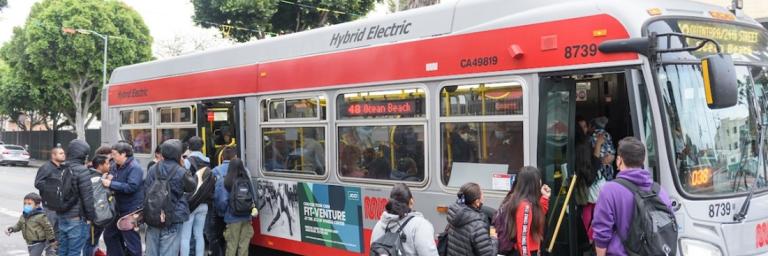The Muni Service Equity Strategy is one component of the agency's commitment to make Muni accessible and affordable to all our customers.
The Muni Service Equity Strategy is an ongoing effort to improve service performance in nine Equity Strategy neighborhoods and for seniors and people with disabilities. It builds on federal Title VI requirements that provide equal access to public services. The Equity Strategy delivers timely, measurable Muni service improvements to safety, connectivity to key destinations, reliability, frequency and crowding. The strategy establishes a performance baseline for Muni routes serving each Equity neighborhood, which is monitored annually.
The Muni Service Equity Strategy focuses on improving Muni performance in San Francisco neighborhoods with high percentages of households with low incomes and people of color. The neighborhoods are selected for each two-year Muni operations budget based on the percentage of households with low incomes, private vehicle ownership and race and ethnicity demographics. The neighborhoods are selected based on the percentage of households with low incomes compared to the city as a whole; neighborhoods that have lower private vehicle ownership than the city average; and race and ethnicity demographics that identify a higher percentage of low income and minority residents than the citywide average.
As part of this analysis, SFMTA staff identified routes heavily used by seniors and people with disabilities. To do this we reviewed customer boarding data from Senior and Clipper Access (formerly RTC) Clipper Cards. Analysis is also conducted using public comments marked as "ADA" complaints from San Francisco's non-emergency service provider, 311, to narrow down the transit lines that have high ridership.
Currently, the nine San Francisco neighborhoods that are identified by the Muni Service Equity Strategy are the Bayview, Chinatown, the Mission, Oceanview/Ingleside, Outer Mission/Excelsior, Tenderloin/SOMA, Treasure Island, Visitacion Valley and the Western Addition.
The Equity Strategy was developed with the help of the Equity Working Group, which was formed by the SFMTA. The working group evaluates service proposals and the agency’s decision-making criteria for Muni service considering the SFMTA values of equity, trust, economic vitality and environmental stewardship so that the agency can support San Francisco’s social equity, livability and vibrancy. The Equity Strategy is presented to the SFMTA Board of Directors before the development of the two-year operating and five-year capital budgets to ensure funding for implementation.
The Muni Service Equity Strategy Report prepared for the 2023 and 2024 fiscal years reported on how the Equity Strategy was used to plan service restoration during the COVID-19 pandemic, implement service improvements and roll out new projects. The Equity Strategy was central to the restoration of Muni service after it was reduced to the Core Service Network due to the pandemic shelter-in-place. This operationalization of the Muni Service Equity Strategy allowed the SFMTA to optimize service during major staffing and vehicle constraints.
Purpose
The Muni Service Equity Strategy aims to identify and address high priority transit needs in neighborhoods that rely on Muni service the most with tangible solutions that can be implemented quickly (within one to two years) to deliver measurable improvements. These include improvements to safety, connectivity to key destinations, reliability, frequency and crowding. Moreover, the strategy established a performance baseline for Muni routes serving each Equity neighborhood, which is monitored annually. The strategy is focused on frequency, reliability and design. Fare equity and security are not addressed by this strategy.
Next Steps
In spring 2026, the Equity Strategy update will include four parts:
- Transit Improvements, including a recap of those implemented on equity routes during previous budget cycle
- Performance data, including review and analysis of transit performance metrics for equity routes.
- New initiatives and projects underway that further advance equity through transit
- Budget recommendations for transit service based on projected funding levels in next budget cycle
This update will be vetted by the Equity Working Group and brought to the SFMTA Board for review later this spring.
